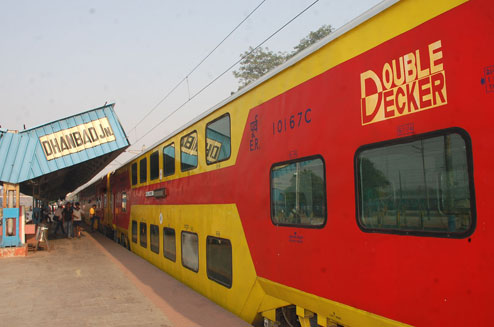Crossings
THE FINGERTIPS of the cobbler have turned yellow and pale. He must has been mending and polishing shoes for years, I assume. For me, the smell of polish and glue in his colourful boxes - black, brown and chocolate - brings a sense of identity and a sense of a home; a home which is not there anymore.
Standing on platform No. 1 of Dhanbad station, suddenly, this smell sparks a flurry of childhood memories - memories of several train journeys from Dhanbad to Calcutta, along with my parents and sister.

Black Diamond Express is usually on time. Even today, it leaves Dhanbad station at 4.25pm, as scheduled. As its wheels and piston gyrate over the rugged tracks, my mind begins to ooze nostalgia.
I recall how these five-hour-long train journeys led to endless conversations with my father about many things: the class-divide in our society, the need for civil resistance in a democracy, the roots of the Naxalbari movement in Bengal, many more such and similar things.
When we (my sister and I) were much younger, travelling with him would mean brushing up on general knowledge. Every time the train stopped at a station - Asansol, Andal, Durgapur - there was something new to learn about the place or its neighbourhood.
As a child I felt a certain sense of joy when the train arrived at Durgapur. Suddenly the black, dusty roads disappeared, an indication that we were leaving the coal belt and nearing Calcutta. I loved the fact that the next few days would be different - free of coal dust, potholes and incessant power cuts. We couldn't imagine our life in Dhanbad without any of these evils though. Over a period of time, we even stopped complaining. In fact, we learnt to laugh at our own miseries like many others who lived in what was still Bihar.

One may remember how the former chief minister of Bihar, Lalu Prasad, coined a metaphor for bad roads that later entered the lexicon of political hyperbole. He said, "Bihar ke sadkon ko Hema Malini ke gaal ke tarah chikna bana denge (We will make Bihar's roads as smooth as Hema Malini's cheeks)."
Needless to mention, that never happened. Taking potshots at him, there was another joke that did the rounds. " Sadke Hema Malini ke gaal ke tarah toh bani nahin, Om Puri ke gaal ke tarah ban gayi (The roads never became like Hema Malini's cheeks but they certainly remind us of Om Puri's cheeks.)" No offence to the late actor though!

Neither my parents nor I live in Dhanbad anymore but I must admit that the thought of potholes and coal dust makes me nostalgic today.
There is something else that is making me nostalgic now. It's the smell of the scrumptious singara (samosa) served to a burly co-passenger by a vendor at Burdwan station. The man also asks a teaseller to pour him some tea. "Beshi chini nei toh (Hope there isn't too much sugar in it)," he asks. The teaseller replies, " Roj sokale morning walk korun (Go for morning walks every day)!" The man is at a loss of words. He probably never expected repartee like this.
While travelling alone, overhearing conversations of others makes a train journey interesting for sure.
If you are lucky, you may get to hear some interesting monologues too. Say for this one by a man trying to sell "air-conditioned" socks. He says, " Apni hoyto bhabchhen ami bhaat bokchhi, kintu motei na... shei Black Diamond jakhon double decker chhilo, takhon theke ami jinish bikri korchhi (You may think I am talking gibberish but that's not the case. I have a reputation of selling things on this train for many years, since when it had double decker coaches)."
Now the mention of double decker coaches reminds me of another eventful journey when I had lost my way to my seat. But of that, another day!
For now, it's time to get off at Howrah with a fresh sense of longing for Dhanbad.
Sonia Sarkar










